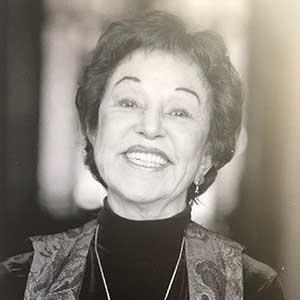
January 2023
Nomi Trapnell
(BA, Political Science, ’60)
Q & A:
- What was your favorite class, who was your favorite professor, or what is your fondest memory of Hofstra?
I liked all my classes, so I was always switching majors. When I took a political science course with Dr. Herb Rosenbaum, I changed my major to political science. - What was your first job after graduating from Hofstra, and what was the most valuable thing learned in that position?
My first job when I moved to California was at Lockheed. Large mainframe computers were used for orbit simulation, and I was encouraged to learn programming, which I loved. I became an expert in these large software programs and decided to work for a computer company. - What is your field of specialty, and how did you come to work in the industry?
I started as an individual contributor in software systems programming, but I was encouraged to become a project manager and then a people manager. I rose through the management ranks and became one of the very early female executives in the computer industry. - What advice would you give Hofstra students?
Make sure that your major will lead to a financially rewarding career, hopefully in a field you enjoy. When I graduated with a political science degree, there were few jobs I could get. Luckily, I had also taken many technical courses and was able to step into the computer field. If you have a financially rewarding job, you’ll have the resources to do many other things besides work. - In one word, how would you describe Hofstra?
Pioneer - Of all your positions held, which job did you enjoy the most?
Management jobs in the computer field. It made use of all my skills: people skills, writing skills, technical skills. The best job was at ROLM, which began as a Silicon Valley startup and offered interesting work, a good salary, and stock options. ROLM was one of the first Silicon Valley companies to have an on-site recreation center with indoor/outdoor pools and chef-prepared food in the cafeteria; it was so successful that it was acquired by International Business Machines Corporation (IBM). - What was a major obstacle you were able to overcome to perform your job?
It was not easy to be a woman in a technical field and to progress into executive management. However, I was fortunate to be in a field that was growing so fast that if you were good at what was needed, you’d get ahead. Also, working for open-minded companies helped. - Who was the person who most influenced you, and how?
One of the executives at Control Data believed in me and my work and became my mentor. He would help me with career advice and had my best interests at heart. When I was unhappy that the company would not send me to my preferred management program at Stanford and instead insisted on sending me to a management program in Boston, I was going to quit. My mentor said, go to their chosen program first and then decide if you still want to quit. This was sound advice. I did eventually leave the company, but the Boston management program trained me for executive management. - What is the single most rewarding/exciting experience in your career?
The most rewarding/exciting experience of my career was at ROLM; it was at the leading edge of new technology and pioneered the culture that became Silicon Valley. ROLM was bought by International Business Machines Corporation (IBM) and then by Siemens. I also worked at Tandem (another Silicon Valley company), which was acquired by Compaq and then by HP. I was fortunate to experience so many different corporate cultures due to company acquisitions. The company cultures were very different from each other, and it was eye-opening to see these companies from the inside.

Nomi Trapnell was born in El Salvador and was 10 years old when her family came to the United States. She earned a degree in political science from Hofstra University and a degree in math from San José State University (SJSU). Following graduation from SJSU, Nomi gained employment at Lockheed, working on scientific orbit stimulation applications. From there, Nomi moved to a career at Control Data, which made very large mainframe computers for scientific applications. She joined Control Data Corporation and was then promoted to computing management and was eventually in charge of software system design for the largest computer line.
In search of a company with its headquarters in the Bay Area, Nomi took a job at ROLM, named after the founders Gene Richeson, Ken Oshman, Walter Loewenstern, and Robert Maxfield. Nomi enjoyed the work environment at ROLM, particularly being able to use the swimming pools, gyms, and other sports facilities during the day. She was promoted to vice president of product development and moved to another headquartered company, Tandem (which was later bought by Compaq and then HP); Nomi eventually retired from her role as product manager.
During her career, Nomi received numerous awards, including the Tribute to Women in Industry from the YWCA, the International Business Machines (IBM) Achievement Award, and the Compaq Outstanding Accomplishment Award. Since retirement, she volunteers in the community, serving as docent at the Computer History Museum, financial chair at the Women’s Club of Palo Alto, commissioner for Los Altos Historical Commission, previous President and board member of the Los Altos History Museum, and a past board member of the YWCA. In recognition of her community work, she received the joint Los Altos/Los Altos Hills Volunteer Award.
Nomi was a female “pioneer” in software engineering and product management and is married to Fritz Trapnell, also a pioneer in the computer field.

